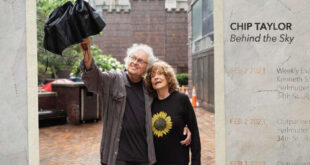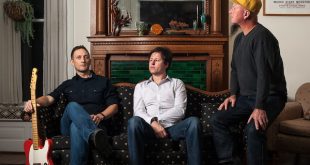This week’s round-up demonstrates the enormous variety of what we call, for want of a better term, folk music.
Mike Golay, Across the Bridge and Half Pint (solo acoustic guitar)
Fans of the acoustic guitar, get thee to thy record store and pick up one or both of these CDs from six-string master Mike Golay. Virtuosic but not flashy, soothing but not new-age precious or background-music boring (although they’ve been serving as excellent relaxing background music for me in my office), Golay’s pieces express the soul of the often taken-for-granted instrument.
One can hear Hawaiian strains and Celtic touches here and there, and many of the titles are evocative or quirky (“111 Archer Avenue,” “Somewhere I Have Never Travelled,” “Baby With a Hammer”), but overall the music is a-cultural, its language the universal tongue of plucked strings. Some songs are more melodic, others more atmospheric, and Golay will throw in an unexpected bend or chromatic line in places. But there’s not a sour note to be heard.
Though both CDs are thoughtful and the songs varied, the more recent Across the Bridge is perhaps the more contemplative of the two. It’s also longer, so if quantity is your goal and your budget allows for only one solo acoustic guitar album, go for that one. If you can’t get enough acoustic guitar, get both. You can sample the tracks at CD Baby (or iTunes, though as yet it has only Half Pint) before you buy.
This style of music doesn’t get a whole lot better. Highly recommended.
Irina Rivkin, upwelling
Although we are in a richly creative time marked by cross-pollination of musical styles and traditions, this CD stands out as something really different. In a mere 36 minutes Irina Rivkin pulls together aesthetic, emotional, political, sexual, and social justice themes into a contiguous and unique artistic statement. Despite the coffee cups in the cover photo, Rivkin’s work is very far from the “lesbian coffeehouse music” that I anticipated. Instead it’s a kind of world-folk spawned from the artist’s Russian folk-music background and acute sensitivity to personal and political injustice, and informed by a crossover-jazz sensibility a la Leonard Bernstein and a mildly experimental bent akin to that of Kate Bush or Meredith Monk.
It’s all that, and it’s pretty to listen to too.
The instrumental accompaniments are light to nonexistent, as Rivkin’s voice is the prime instrument here, bolstered by those of the excellent Maria Quiles and Rebecca Crump (who together with Rivkin comprising the group Making Waves). Rivkin sings her angular melodies in a voice that switches easily from soft to sharp. Where the other voices jump in, the sound becomes more universal and more exotic at the same time: discrete moments could have come as easily from a North American roots-revivalist group like the Be Good Tanyas as from an exotic, arty hitmaker like the Bulgarian Women’s Choir.
Her lyrics, for the most part, manage to be both pointed and poetic. Political music is hard to pull off, especially if it’s not satirical, and, except in “Welfare-to-Work Blues,” which is musically creative and elegant but lyrically forced, Rivkin accomplishes the difficult task very well. “See Through Bush” is clever and light-handed and the more cutting thereby; the Spanish-language “Sobrevivientes” raises a fist of musical beauty against oppression; and the chant-like “Taking Our Freedom” deepens its message with hypnotically intense music while personalizing it with a dollop of family history.
The non-political songs are rewarding too. Rivkin’s reflections on love and its accompanying troubles range from the imagistic (“Little Silver Packets,” “River & Volcano”) to the painfully explicit (the Outmusic Award-winning “Ya Eyo Lublu”), and, unlike most lyricists, who are at home only in one mode or the other, Rivkin can convince with words both clouded and clear.
Russ Rentler, Scarecrow’s Lament
The new disc by Russ Rentler, who was an early bandmate of the folk stars John Gorka and Richard Shindell, is really three CDs in one. First, it boasts three beautiful instrumentals: two traditional tunes and an original, in which Rentler’s consummate skill on a wide array of stringed instruments (too many to name, but dulcimers are prominent) takes center stage. Then there are the humorous songs, including “New Car Smell,” which has been heard on the syndicated NPR show Car Talk, and the autobiographical (and hysterical) “One-Eyed Grandma.” Finally there are thoughtful and earnest songs of love, family and the ways of the world.
Rentler’s singing, and to some degree his writing, are throwbacks to the Folk Revival period of the 1950s and ’60s, specifically the plainspoken voices of artists like Oscar Brand, Pete Seeger, and the Kingston Trio, who gave audiences a sincere but somewhat whitewashed refraction of the traditional music of Appalachia and its antecedents in the British Isles. That mode is entirely out of fashion in today’s folk revival, which goes by names like Americana, Alt-Country, and Rick Rubin, and which prizes authenticity, whether native (Ralph Stanley, the Blind Boys of Alabama), studied (Old Crow Medicine Show, Alison Krauss) or transformed (Devendra Banhart). Rentler sings with much heart and little art, but after a couple of songs one gets used to it and goes with his honest and ultimately refreshing sound.
There’s one big problem: clunky lyrics. Rhymes that don’t rhyme, words that stick out awkwardly from their melodies, and references that are just a wee bit off (“those times they’re a-changin'” isn’t exactly what Bob Dylan said) come too frequently to fall under the protection of artistic license.
Fortunately, formal flaws are often forgivable – and can even have a naïve charm – in funny songs, of which Rentler has several. It’s the more serious lyrics, like the love songs “Waltzing Amelia” and “Moravian Street,” that don’t trip lightly into the ears.
Rentler’s previous CDs are available at the iTunes music store and presumably this one will be too once it’s processed by the great big Apple music chomper, so I’d recommend – unless you’re already a fan – that you listen over there, check out the instrumentals first, and then the rest, before laying out cash for the CD. I’m lucky enough to have a review copy, but iTunes gives you the choice to download the songs you like. For sure, the instrumentals are going into my iTunes library. Folk revival or not, it’s a brave new world out there for music fans; happy downloading.
Available at CD Baby .
Various Artists, The Independents
Norine Braun was kind enough to send me a copy of her company’s first compilation, straightforwardly titled The Independents. As with any collection of this type, the quality of the music is uneven, but it’s a well-chosen assortment that flows better than most, opening with three strong tracks: Braun’s own epic-pop number “Alberta,” Dudley Saunders’s literary, electronic-traditional hybrid “Truck of the Rising Sun,” and Maya Solovey’s international pop gem “Dissolving.”
Skinflick does a good job aping the Foo Fighters, while Krescent 4 similarly worships Soundgarden. The UK’s The Papers aim for Neil Finn territory with their catchy pop-rock nugget “Lonely Being Beautiful,” and Anton Glamb’s “Subway” is lighthearted and amusing. Tracy Stark – an in-demand session keyboardist in New York indie circles and beyond – nails a nifty, jazzed-up adult contemporary vibe in “So Cool.” Patti Witten evokes Roseanne Cash’s smooth country-pop-rock style with the lovely, atmospheric “Black Butterfly,” and Salme Dahlstrom’s “Hello California” is crystalline, guilty-pleasure pop.
OUT AND ABOUT: When is a concert a community? When it’s Meg Braun (no relation to Norine Braun) and Sharon Goldman’s fundraiser for the Summersongs non-profit adult songwriters’ camps, with which more and more top-shelf folk musicians are associating. Last night’s concert at Makor in New York City included mini-sets from about a dozen artists, among them the monstrously talented Sloan Wainwright, who writes sophisticated and captivating songs and gives a singers’ clinic every time she opens her mouth; bluesman Scott Ainslie, who held the audience spellbound with his Allman-esque voice and what may be the only song about the Vietnam War ever written for a children’s record; and – she’ll forgive me for this characterization – modern folk’s eminence grise Christine Lavin who had the crowd in stitches as she often does. Spotted in the crowd were other tour-circuit stalwarts like serious funnyman Eric Schwartz and jazz-pop original Allison Tartalia… Speaking of Allison, she’ll be performing tonight when my Soul of the Blues series continues at Night and Day in Brooklyn, along with Ian Thomas ( “Best Nostalgia-Free Revival Act of 2005,” NY Press) and Adam Payne whose soulful “sound is as big as his afro.” If you’re in the NYC area tonight, it’s a show – and a mural – not to be missed.
 Blogcritics The critical lens on today's culture & entertainment
Blogcritics The critical lens on today's culture & entertainment



